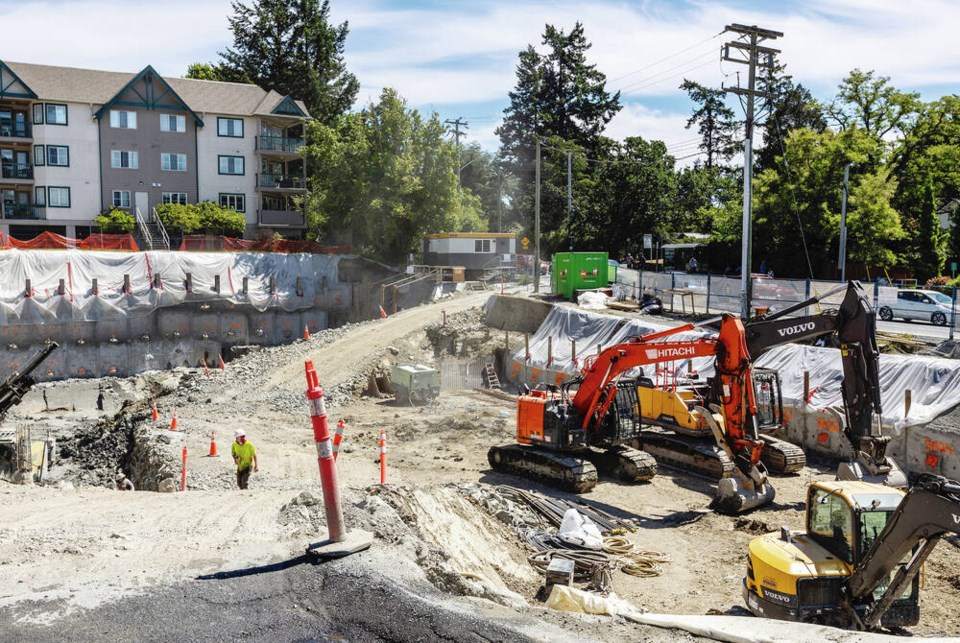Premier David Eby says it’s a mistake to see any city’s placement on a list of communities that need to do more to increase housing — which includes Victoria and Langford — as a judgment about what they’ve done to date.
“Victoria and Langford have done some very interesting and important housing work and in many respects are our models for other cities,” said Eby in a phone interview with the Times Colonist from Singapore. He’s wrapping up a 12-day overseas trade mission that includes a review of housing approaches in the Asia-Pacific region.
“I think there are some folks that want to view this as the province saying who’s doing well and who’s not — that’s not the case.
“What we’re trying to do is match up where we’re seeing population growth and where we’re seeing the demand with the ability of the cities to deliver that and to formalize our discussions around hitting those targets, but also what supports are needed to make that successful.”
Last week, Housing Minister Ravi Kahlon released a list of 10 municipalities — including Victoria, Saanich and Oak Bay — that he said will need to meet certain targets for approving a mix of housing. The housing targets will be set this summer and municipalities will have six months to show progress.
It later released a 47-municipality expanded list, which includes the 13 municipalities in the Capital Regional District, and targets those with the greatest projected population growth, the highest need, and the land and means to provide needed affordable housing.
The shortage of essential housing in B.C. is hurting the province’s economy, said Eby, who was accompanied on his Asia trip by Energy Minister Josie Osborne, Development Minister Brenda Bailey and Minister of State for Trade Jagrup Brar.
“It’s driving homelessness, it’s driving dramatically increased rents,” said Eby, “and we need all cities to understand that and to push in the same direction as us, which is why we’ve introduced housing-target legislation so that we can make our understandings with cities explicit and provide the support to hit mutually agreed targets.”
With the province facing a housing crisis, Eby says now is not the time for any community to press pause on development.
View Royal Mayor Sid Tobias has proposed a moratorium on all new developments for six months, just as the town finds itself on the list of communities that will have to do more to increase housing. Council voted on the motion Tuesday night, defeating it in a 3-3 tie vote, said Coun. Gery Lemon.
“This is not a time in British Columbia for us to stop building housing,” Eby said. “This is the time for us to accelerate housing construction.”
Eby left on May 27 Eby to visit Japan, South Korea and Singapore and is due back on Wednesday.
In Singapore, with a population similar to B.C.’s, 90 per cent of residents live in some form of government-developed housing and own their own homes, said Eby.
The premier said he was interested to see the country’s initiatives in creating public housing in high-density areas. His delegation met with the country’s housing authority and development boards.
But while Singapore has done a great job of ensuring housing for residents, Eby said expats living in Singapore and working for large banks report having a “profoundly difficult time finding housing,” citing 100 per cent rent increases because there is no rent control.
“So even in Singapore, a country that’s really focused on finding housing, they’re experiencing these housing shortages as well and in their public housing program they are having trouble keeping up with demand because of labour shortages and increasing costs related to supplies,” said Eby.
Eby said some of the most interesting housing insights came from his visit to Japan, B.C.’s third largest trading partner after the United States and China.
Eby said the delegation met with Japanese company Daito Trust Corporation because they build their housing out of wood, and Japan is B.C.’s highest-value and oldest market in Asia for forestry products. B.C. sold forest products to Japan valued at $1.6 billion in 2021.
In the meeting, he said, the company revealed that its real estate and rental arm partners with landowners to build rental housing for the landowner, with financing, and leases that rental housing from the landowner for 30 years, providing the landowner with fixed payments.
“Essentially, it’s a turnkey operation where they turn your land into rental housing and run it for you and then hand it back after 30 years,” said Eby.
“They’ve been very successful with that model and they’re interested, potentially, in expanding it. They are looking at British Columbia, so that was a fascinating discussion about their business model and about their interest in B.C.”
Daito has about 1.2 million units under that management model in Tokyo, a city with a population of about 14 million. Eby said he has connected the company with B.C. trade representatives.
In Seoul, South Korea, Eby said he met with Seoul Housing Corporation, owned by the City of Seoul, which has a population nearly double that of B.C.
The non-profit corporation helps build middle-income housing similar to the housing strategy under the B.C. Builds program, said Eby, adding he’s connected the corporation’s policy staff with B.C.’s policy staff to ensure “we’re not repeating any mistakes and and also that we’re not missing any opportunities.”



